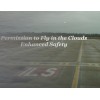WHY GET THIS RATING
Studies show that pilots with instrument ratings tend to fly safer. The skills acquired with this rating allow a pilot to safely fly in clouds without outside visual references. Pilots also learn to make approaches and landings in weather conditions that are not considered ideal. Imagine being above the clouds without being able to see land, using radio or GPS equipment to guide you down through those clouds, then breaking out and seeing the runway right in front of you. The instrument rating does more than give you permission to fly in bad weather. It teaches you what weather conditions are good for Instrument flight and what conditions should be avoided. You learn how to scan cockpit instrumentation use the information to safely travel through the skies.
The Instrument Rating is a requirement for an unrestricted Commercial Pilot License, but that is not the only reason to get this training. Instrument rated pilots have a wealth of additional tools at their disposal and their decision making skills are enhanced by being exposed to new scenarios and weather conditions.
The instrument rating will allow you fly in weather conditions such as fog, rain which reduces visibility, snow, and clouds.
REQUIREMENTS FOR THE INSTRUMENT RATING
In order to obtain an instrument rating, you must
Be a Private Pilot
Meet flight experience requirements
Meet flight training requirements
Pass a written knowledge exam
Pass a practical (flight and oral) exam





